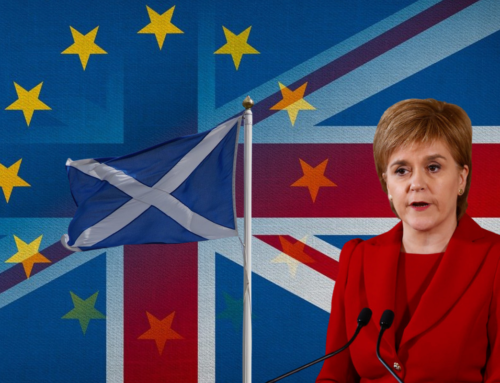
by Brendan Donnelly
Director, The Federal Trust
20th May 2019
Theresa May’s decision to hold a Parliamentary vote in the week beginning 3rd June on the Bill implementing the Withdrawal Agreement from the European Union will have two probable consequences. First, it will provide her with a brief respite after the (likely) catastrophic Conservative results in the European Elections. Last week, the executive of the powerful 1922 Committee of backbench Conservative MPs agreed to wait upon the result of the Parliamentary vote before pressing further for the Prime Minister’s resignation.
The second consequence is that when that vote fails it will inevitably mark a humiliating end to her premiership. The chances of the Bill’s passing are minimal. With a leadership contest looming, those Conservatives eager to replace Theresa May in 10 Downing Street will not let slip the opportunity of demonstrating to the Party membership the rigour and vigour of their opposition to the Withdrawal Agreement. The Parliamentary majority against the Agreement is likely to be greater than the 59 votes by which it was last defeated on 29th March.
In its mixture of marginal short-term benefit and wholesale ineffectiveness in the longer term, the Prime Minister’s last throw of the Parliamentary dice next month is a fitting culmination of her premiership. The inherent contradictions of Brexit itself and the dysfunctionality of the Conservative Party have progressively limited what little freedom of political manoeuvre she may once have had. Her own mistakes, notably the calling of the General Election in 2017, have certainly worsened this position, but given the lies and delusions which underlay the Leave victory in 2016, there could never be any remotely happy or satisfying outcome to the Brexit process. Theresa May’s premiership has been ground down between the millstones of increasing national confrontation with the reality of Brexit and a purblind refusal of large parts of her own Party to accept this reality. Her incapacity persuasively to explain the reality of Brexit to her Party has bequeathed it and her country a dangerous legacy, which will be played out in the leadership contest of the next few months.
The members are unhappy
Within the Conservative Party membership there is widespread discontent with the conduct of the Brexit negotiations by the Prime Minister. It almost universally believes that a resolute leader, more convinced than Theresa May of the intrinsic merits of Brexit, would have been able speedily and effectively to deliver the referendum “mandate”, which in so far as it could be precisely discerned, was to ensure that the UK withdraw from the EU while continuing to enjoy the economic benefits of the freest possible trade with it. This unattainable goal was well summarised by Boris Johnson’s oft-quoted phrase of “having our cake and eating it.” Many Conservative members can see no reason why in dealing with the ‘corrupt, incompetent’ EU the UK should not be able to do precisely that. It seems highly likely that they will choose Johnson himself to be the next Party leader. He will have been elected on a programme of radical renegotiation of the Withdrawal Agreement and advocacy of Brexit with “no deal” if this proves impossible. This, moreover, will be the essential programme of any future Conservative leader, even if it is not Johnson himself. The pursuit of such unrealistic aspirations will inevitably make for further economic and political destabilisation over the coming months.
There is a view among some British political commentators that once elected Prime Minister Boris Johnson or any other radical Eurosceptic will soften his or her rhetoric and realise the unachievability of the ambitious programme which won the hearts of the Conservative membership. This supposedly will lead in its turn to a more realistic approach to the Brexit negotiations, with perhaps a further extension of the Article 50 negotiating period beyond the October 31 deadline reluctantly granted by the European Council in late March.
This is fundamentally to misunderstand the internal dynamics of the Conservative Party, particularly of its membership. Its Eurosceptic radicalisation is now so far advanced that it would be impossible for the Party to survive the acceptance by its leader of any conceivable Withdrawal Agreement that might be agreed with the EU27. The wholesale migration of Conservative members and supporters towards the Brexit Party of Nigel Farage on 23rd May will be for the next Conservative leader a salutary reminder of the party’s current fragility. Boris Johnson or any other leader will face in yet more acute fashion later this year the fundamental problem with which Theresa May has wrestled, namely the choice between the future of the Conservative Party and that of the UK. Theresa May has sometimes attempted to put the national interest before her Party’s interest. Her successor is unlikely to have the inclination or even the opportunity to do so. The inevitable success of Nigel Farage in the European elections will force the next leader of the Conservative Party to draw the catastrophic conclusion that the Party can only be maintained in any semblance of unity by a yet more aggressive display of uncompromising Euroscepticism.
Can a split be avoided?
It is true that the leadership of Boris Johnson in particular would provoke a possibly drastic reaction from a minority of Conservative MPs. How far and in what way these MPs will be prepared to press their unhappiness is the present unresolved central question of British politics. There are perhaps twenty or thirty who might consider voting against a Johnson-led government in a Vote of Confidence, thus probably triggering a General Election in October. A similar number might consider forming an independent Parliamentary grouping, reinforcing the faltering Change UK or joining the Liberal Democrats. Such a splintering of the Conservative Parliamentary Party would not necessarily be unwelcome to Boris Johnson as Prime Minister. He might well conclude that he was well-placed to win a General Election on a radical Eurosceptic prospectus, which would bring back into the Conservative fold those voters who had defected to Nigel Farage. An electoral pact with the Brexit party for an autumn General Election would be a real possibility under a Johnson premiership. Nigel Farage for his part might well conclude that such a pact was his best opportunity to bring about a reverse takeover of the Conservative Party brand, with himself as ultimate leader of a reconstituted Conservative Party.
The UK avoided a “no deal” Brexit in late March because Parliamentary pressure combined with the (wholly rational) hesitancy of Theresa May to postpone the threatening catastrophe. There can be no guarantee that this happy conjunction of circumstances will obtain in late October of this year under a Johnson premiership, particularly if a General Election has in the interval returned a Brexit/Conservative coalition government.
There has been much criticism of the failure of various “Remain” parties to coordinate their activities in the European elections. There will be a considerable incentive for them to engage in such co-ordination during the General Election that might well be the consequence of a new, more radical Conservative leadership. This incentive could only be enhanced if the Labour Party continues with its present equivocal position on the European issue. The much larger number of Westminster constituencies would also make a “grand bargain” easier to achieve between a pro-European Conservative grouping, Change UK, the Liberal Democrats, the Greens, the SNP and Plaid Cymru than in the limited number of European electoral regions. That no such arrangement has been accomplished, or even mooted in recent British political history should not exclude such a bargain as a possibility. The Brexit tsunami is destroying all the certainties of recent British political life.
Can the Remainers organise?
In the period leading up to the first Article 50 deadline on 29th March, there was much comment and speculation that the UK would leave the EU without an agreement “by accident,” because the House of Commons had not found a way of making effective its undoubted majority against leaving with “no deal.” The 7-month extension of the negotiating period has temporarily quietened such concerns, but the imminent replacement of Theresa May by a more ideologically driven successor is a factor that has not yet been fully appreciated in the calculations of those MPs who wish to prevent “no deal.” The important minority of Labour and Conservative MPs who have fundamental doubts about the European policies of their respective parties could profitably spend time over the summer reflecting on the political combinations now open to them.
Unless the important “Remain/People’s Vote” elements within the Commons find a better way of making their political weight felt, they run a real risk of an October General Election’s being a simple contest between the “no deal” Brexit offered by the Conservative Party and the ever-shifting ambiguities of a Labour Party racked by division between its pro-Brexit leadership and its anti-Brexit membership. The Liberal Democrats have been rightly encouraged by their relative success in the local elections and their likely success in the European elections. Even so, it is unlikely that they will be able on their own to reconfigure the map of British politics six months from now.
There are a number of options for an anti-Brexit coalition in the next General Election in opposition to the “no deal” coalition of the Conservative Party and Nigel Farage. But this coalition will not come about of itself. It needs hard thinking and hard decision-making, which need to start immediately after polls close for the European Elections. Opinion polls suggest that there is probably now within the public a definite majority in favour of the UK’s remaining in the EU. Warnings by Conservative Ministers that a People’s Vote could prevent Brexit unwittingly reinforce this assumption. It would be a possibly terminal failure of the UK’s political system if this majority did not receive adequate reflection in the choices offered by forthcoming elections. A second-rate candidate for the US Supreme Court supposedly once told critical Senators that he was unusually well-qualified to represent the millions of mediocre Americans in the land’s highest court. Pro-Remain voters here have the right to no less representation in the political and Party organisation of their country.






